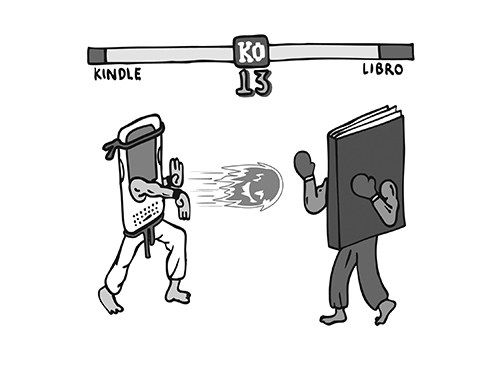
Over the last several years, e-book sales have grown exponentially. More and more people are reading e-books as sales of e-readers and other tablets increase as well.
With the growing popularity of digital books, readers and the publishing world are beginning to question the longevity of the printed book. The closure of the national bookstore chain Borders also seems to foreshadow the fall of the paper book.
Does this mean the printed book will soon become a relic of the past?
No. People still really enjoy reading paper books, and they still have a lot to offer to our reading experience. People may rave about the portability and accessibility of e-books, but it’ll be a long time until they overpower their paper counterparts.
The paper book looks like it’s here to stay, at least for a little while longer. And so are e-books. Both formats represent the future of reading, so you don’t have to stand on only one side of the paper vs. digital debate.
There shouldn’t even be a debate. E-books should add a new dimension to reading, not replace their forerunners altogether. It’s a matter of finding a balance and using each format as a complement to the other.
Each has benefits that the other doesn’t, but that doesn’t make the other bad, worse or somehow deficient. Rather, one format’s negatives highlight the benefits of the other.
E-books
Many people, especially those on the cutting-edge of technology, gravitate toward e-books. Reading a digital book eliminates the need to carry around a physical copy and reduces your daily load. It’s just easier and more portable, since most e-readers are small, three-pounds-or-less devices.
Even schools are offering digital copies of textbooks, usually at lower prices. The incentives to buy and read digital books are multiplying. But despite these incentives, e-books also have some downfalls.
For one, you must have an e-reader in the first place. That’s an additional $100 (or more, depending on how fancy you want to get) expense—an expense literally nonexistent with paper books. You could buy a lot of paper books with that much money.
For another, you’ve now turned reading into an activity that requires battery power.
While charging our electronics has become second nature, forgetting to plug in your tablet one night might mean that you can’t finish the great book you’ve been reading. For some people that’s a deal-breaker.
Print books
I’m partial to printed books. The smell of a newly printed book is amazing (and the smell of used books is pretty good too). Plus, with all the constant technology and connectivity, it’s nice to have a form of entertainment that doesn’t require a battery or an Internet connection.
Unlike e-books, paper books can be easily lent and traded (although with programs like Amazon’s Kindle lending option, this is changing). When you purchase an e-book, you aren’t really buying a book; you’re buying a license to it. It’s not tangible property, just a combination of pixels and light. Confining your “book” to an e-reader makes it more difficult to enjoy the other pleasures of reading, like sharing or inscribing on the inside front cover a lovely epigraph to the lucky soul getting the book.
Here’s something else to think about: On a base level, physical books are more eco-friendly than e-books. An e-book doesn’t require any physical materials (other than the computer required to create it and the server to store it), but the materials in your e-reader are a lot harder to recycle than a simple stack of paper. In the long run, you’ll be doing the earth a favor by buying paper books.
But even paper books have their downsides. Paper can be torn up; paper can succumb to humid environments and get moldy; paper grows brittle and darkens with age; ink fades; bindings fall apart; and you can’t cart an entire library of books around with you on a daily basis.
E-readers are arguably easier to hold and handle, and even have built–in applications and dictionaries that define words that you may not be familiar with.
All in all, though, it doesn’t have to be about which is better, or picking one over the other. We should be using these different formats as complements to one another. E-books should be viewed as an extension of printed books, not as a replacement.
